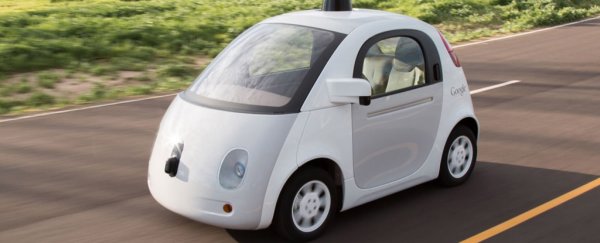In a major step forward for self-driving cars and the industry seeking to manufacture them, US highway authorities have informed Google that its autonomous vehicle systems could qualify as a "driver" in the eyes of the law.
A letter addressed to the company from the National Highway Traffic Safety Administration (NHTSA) last week suggests that if self-driving vehicles (SDVs) can satisfy a number of safety standards, the fact that artificial intelligence (AI) is controlling the car – in the absence of any human controls – would not be a barrier to the car legally driving on US roads.
"We agree with Google its SDV will not have a 'driver' in the traditional sense that vehicles have had drivers during the last more than one hundred years," writes chief counsel for the NHTSA, Paul A. Hemmersbaugh. "If no human occupant of the vehicle can actually drive the vehicle, it is more reasonable to identify the 'driver' as whatever (as opposed to whoever) is doing the driving. In this instance, an item of motor vehicle equipment, the [SDS Self-Driving System], is actually driving the vehicle."
While the letter offers only a qualified acknowledgment that AI systems could legally take over the steering wheel since nobody else in the car can do that job – some of Google's prototype vehicles, for instance, don't have steering wheels, gas pedals, or brakes for humans to operate – it's still being considered a major boost for self-driving transport.
"The intricate maze of legal questions surrounding autonomous vehicles is as big a hurdle to their arrival as the remaining technological challenges," automotive industry analyst Karl Brauer told Jordan Golson at The Verge. "However, if NHTSA is prepared to name artificial intelligence as a viable alternative to human-controlled vehicles, it could substantially streamline the process of putting autonomous vehicles on the road."
Advocates of self-driving vehicles point out that statistically, they're much less deadly than human drivers on the roads, but safety concerns mean they're still in all likelihood several years away from ferrying us around.
Aside from the efficiency of their AI-based systems, there's also the question of security, with today's Internet-connected vehicles already giving significant cause for concern when it comes to hacking.
Consumer ambivalence is another factor to consider, with polling showing human drivers aren't exactly wild about handing over control to machines. There's also the uneasy question of how people feel about AI systems that in some instances might be compelled to kill their drivers in order to save others.
Which are all ways of saying, as much as we love the idea of self-driving vehicles, this partial greenlight from the NHTSA is just one small victory on the road to them becoming a reality.
